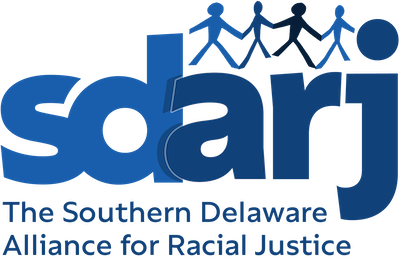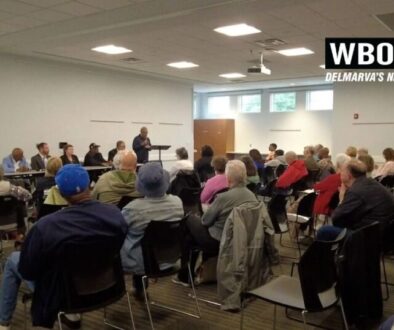Legislative Wrap Up for 152nd Leg. Session
Legislative Advocacy Committee Year-End Wrap-Up
The Legislative Advocacy Committee supported the following bills in this, the 152nd Legislative Session.
Bills that Passed
Criminal Justice
HB267: prohibits the Family Court from imposing a sentence of incarceration or ordering the suspension of a person’s license for failure to pay court-ordered child support unless it finds that the failure to pay is wilful and not due to an inability of the person to pay the support. SDARJ supported this bill through town halls and with written support in legislative committees.
HB70: eliminates the death penalty in Delaware. As such, the penalty for a person who is convicted of first-degree murder for an offense that was committed after the person’s 18th birthday is imprisonment for the remainder of the person’s natural life without benefit of probation or parole or any other reduction. SDARJ provided support from both the Legislative Advocacy Committee and the Returning Citizens Support Committee.
Reproductive Rights
HB110: requiring Medicaid and private health insurance carriers to cover the cost of abortion, with coverage capped at $750. SDARJ supported this through live testimony in the Joint Finance Committee, written support in legislative committees, and through town halls.
SB300: requires crisis pregnancy centers in this state to provide notice if the center is not licensed by this state as a medical facility and does not have a licensed medical provider who provides or directly supervises, in person, the provision of services. SDARJ provided written support for this bill in Legislative committees.
SB301: requires public universities in this state to provide access to medication for the termination of pregnancy and emergency contraception. The medication and contraception must be provided on-site, but consultation to provide them may be performed by a provider at the student health center or by a provider who is associated with a university-contracted external agency. SDARJ provided written support for this bill in Legislative committees.
HB426: ensures that pregnant women in DOC custody, at Level IV or V, are able to meet with a doula or midwife to create a birth plan surrounding the birth of their child. SDARJ provided written support in legislative committees.
Bills That Did Not Pass
Criminal Justice
SB4: Probation Reform. This bill provided extensive reform of the Delaware probation system. The original bill barred incarceration for technical probation violations, required probation requirements be tailored to the circumstances of the offense, and that probationers not be sanctioned for non-willful violations such as being unable to afford the cost or for being unable to attend due to employment requirements, and limiting terms of incarceration for willful violations. A series of amendments drastically watered down or eliminated these provisions. The bill was not brought to the Senate floor for a vote. SDARJ provided support through town halls and written support in Senate committees, as well as support in collaboration with the ACLU Smart Justice Coalition.
HB301: the first leg of a constitutional amendment prohibiting the death penalty in Delaware. The bill was reported out of the House Administration Committee, but did not get the required two-third majority vote to pass in the House. SDARJ provided written support to the House committee and SDARJ’s Returning Citizen’s Support Committee provided live testimony in support, as well as written support.
Voting Rights
SB3: this bill was the first leg of a constitutional amendment to eliminate the limitations on when an individual may vote absentee and authorizes the General Assembly to enact general laws providing the circumstances, rules, and procedures for absentee voting in this State. As a constitutional amendment, the bill required a two-thirds majority. Although the bill passed the Senate, it was defeated in the House. SDARJ provided written support in legislative committees and through collaboration with the ACLU Delaware Voting Rights Coalition.
HB189: prohibiting municipalities from allowing entities within their borders to vote in municipal elections. The bill was reported out of the House Administration Committee but did not make it to the House floor for a vote. SDARJ provided support through a town hall and through written support to the House committee.
HB400: moved the date of primary elections for statewide office, county office, and municipal office to the fourth Tuesday in April, which is the date of the presidential primary (in presidential election years). The bill passed the House, but did not make it out of the Executive Committee in the Senate.
Note: A statute from the last legislative session allowed early voting and permanent absentee voting. This statute was challenged in a lawsuit and the lower court, the Delaware Superior Court, found the statute unconstitutional The state appealed to the Delaware Supreme Court, which reversed, finding that the plaintiffs in the lower court did not have sufficient standing to challenge the statute and that for the coming primary election in September, early in person voting and absentee voting are in effect. To learn more, go to https://gis.elections.delaware.gov/.
Employee Rights
HB17: required all employers in the State to provide employees with a minimum of 1 hour of earned sick time and safety leave for every 30 hours worked. For employers of fewer than 10 employees, the time may be unpaid, job-protected time instead of paid time. The bill was amended, watering down its protections, but still did not make it to the House floor for a vote. SDARJ provided written support by signing on to a letter from a coalition of organizations such as Network Delaware, Women’s March Sussex, Delaware Poor People’s Campaign, Delaware Working Families Party, and Delaware Coalition Against Domestic Violence. SDARJ also provided additional written support to House committees.
Environmental Justice
HB422: defined certain facilities which will require an applicant seeking a permit from DNREC for a new facility, or expansion of an existing facility, or renewal of an existing permit, located in an overburdened community, as defined in the Act, to provide an environmental justice impact report. An “overburdened community” was defined as any geographic locations that potentially experience harms and risks a determined by the Environmental Justice Board or any census tract, as delineated in the most recent U.S. Census, in which one or more of the following is greater than .75 standard percentage of the State average for any of the following: (1) 35% of the residents are below 185% of federal poverty level. (2) At least 25% or more identify as minority or member of a state or federally recognized tribal community or immigrant. (3) 25% or more have limited English proficiency as defined by U.S. Census Bureau. The bill did not make it out of the Natural Resources & Energy Committee in the House. SDARJ provided support through the Delaware Environmental Action Coalition and additional support in the House committee.











